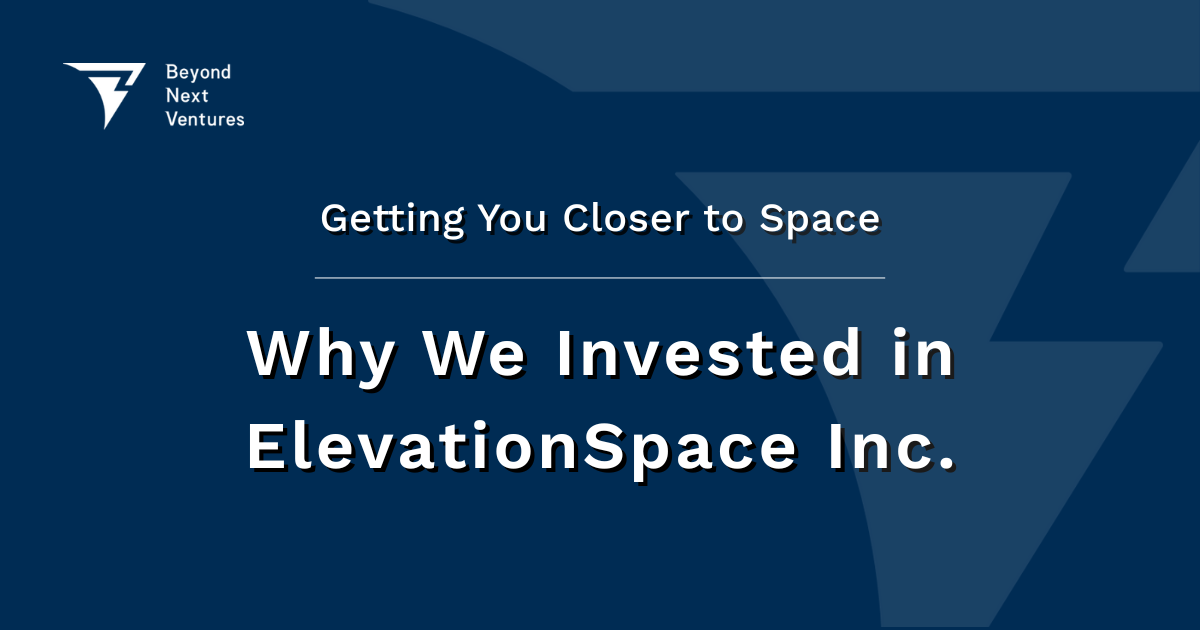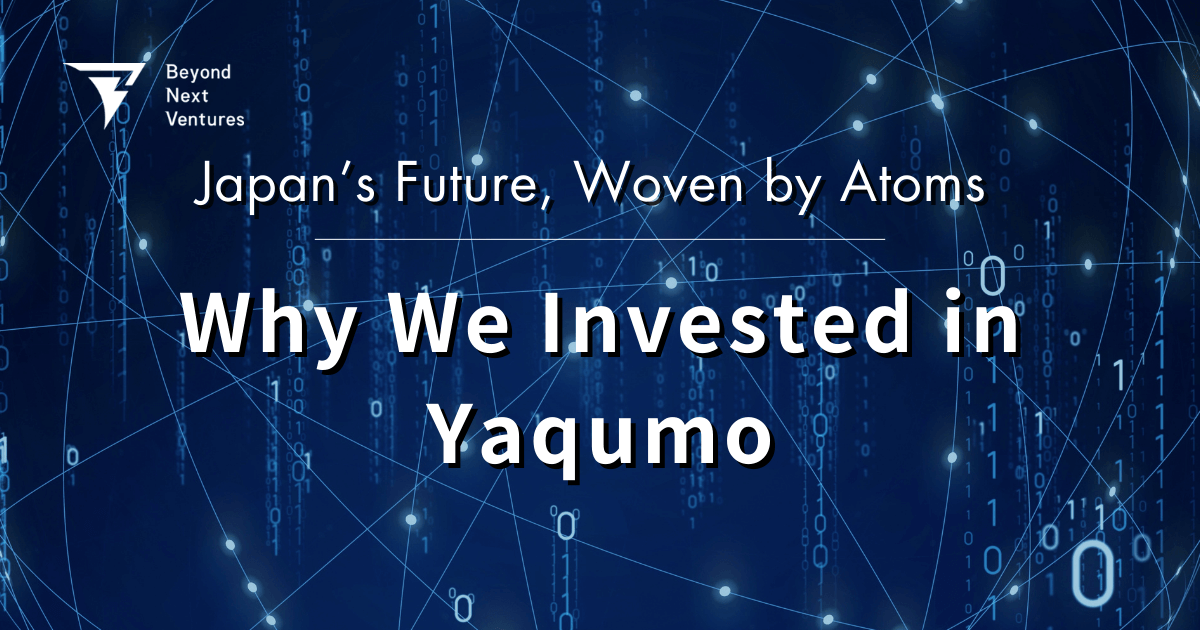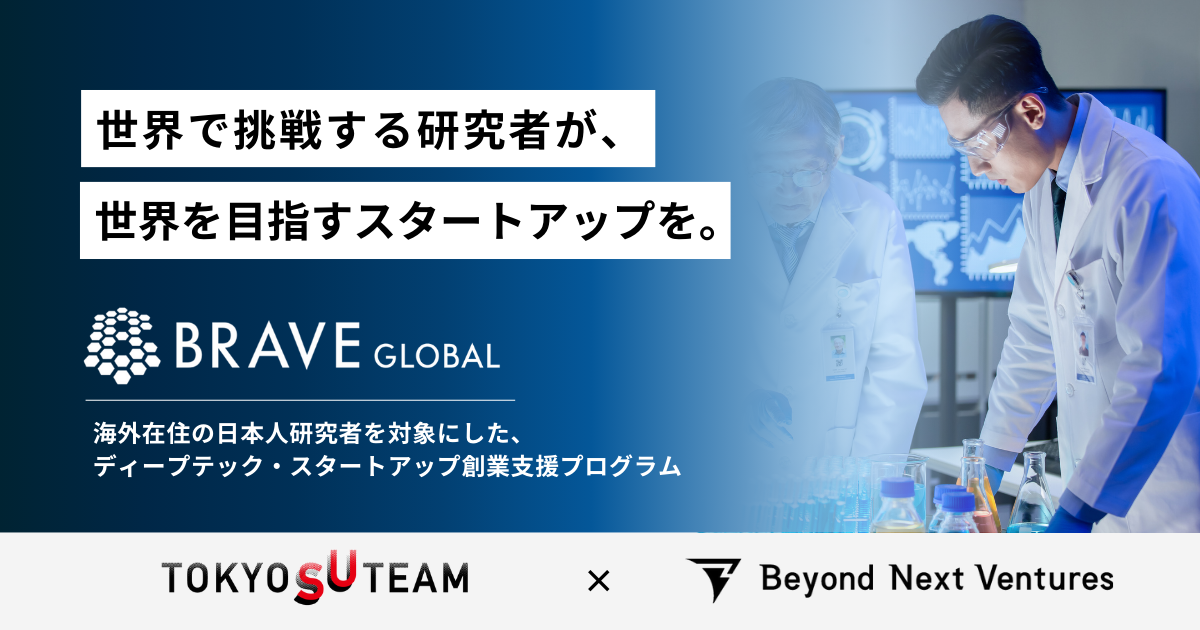Through our Deep Tech-Focused Fund III, we have invested in the space startup ElevationSpace Inc. This Series A round totaled over 1.4 billion yen, with Beyond Next Ventures participating as the lead investor.
ElevationSpace is developing spacecraft that can return to Earth after conducting demonstrations and experiments in space, aiming to realize its mission of “creating a world where anyone can live in space, and enriching the future of humanity.”
In this article, we will explain the background behind Beyond Next Ventures’ investment in ElevationSpace, along with current trends in the space business.
Contents
From Government to Private Sector – The Blossoming of Commercial Space Business
The global space industry is projected to grow to over 200 trillion yen (approx. $1.8 trillion) by 2035 [※1]. Historically, space development has been largely driven by government-led initiatives, but in recent years private-sector space business has been growing rapidly. In particular, areas such as the Moon and low Earth orbit (LEO)—space regions near Earth—are increasingly seeing roles that were once exclusive to government agencies being transferred to private enterprises.
A symbolic example of this shift is NASA’s investment of $800 million starting in 2006 to support private companies providing cargo delivery services to the International Space Station (ISS). The standout success from this initiative is SpaceX, which now commands overwhelming influence in the sector.
With the rise of private rocket launch companies like SpaceX, the cost of transporting materials to space has dropped significantly. For instance, SpaceX’s Falcon Heavy can launch payloads at a cost of $1,500 per kilogram, which is about 1/30th of the cost of launching via the Space Shuttle in 1981 [※2].
Just as the invention of the electric elevator eliminated the constraints of vertical mobility and transformed city architecture by enabling high-rise buildings, easier access to space is expected to dramatically accelerate the growth of private space businesses in the years ahead.
Expectations for Services Utilizing Low Earth Orbit
Looking ahead, significant growth is expected in the emergence of diverse commercial services that make use of space. In addition to the currently dominant satellite-related services, a wide range of space-based services is beginning to spread throughout Earth’s orbit. One example is Astroscale, which went public in June 2024 and is working on space debris removal services.
Furthermore, the shift from government to private sector is also occurring in the field of on-orbit services. A prime example is the International Space Station (ISS), which is scheduled to be retired in 2030. The ISS has long been operated by various national governments, but going forward, its functions are expected to be taken over by commercial space stations (CSS) operated primarily by private companies like Axiom Space. These CSS are anticipated to offer a variety of services that go beyond the traditional scope of the ISS.
As private-sector services in low Earth orbit (LEO) expand, it’s likely that the number of customers making use of these offerings would grow. In this context, a question arises: What will be the next bottleneck in the space business?
We believe that a critical infrastructure component is still lacking for the future growth of the space industry. That is, a “return trip” from space to Earth.
ElevationSpace’s Reentry Technology
ElevationSpace is developing a “return trip” solution—a system for returning materials from Earth’s orbit back to the ground. For humanity’s continued expansion into space, conducting a wide range of experiments and demonstrations is essential to understand how extreme space environments affect human health and functioning of the objects. In many cases, it is crucial to bring experimental results back to Earth.
Even today, the International Space Station (ISS) is equipped with various experimental facilities, enabling diverse scientific studies such as protein crystallization, cell cultivation, and mouse experiments. It also provides exposure to the space environment for companies newly entering the space sector to conduct space demonstrations.
However, methods for returning experimental results from space to Earth remain limited, and constraints related to frequency, cost, and time of material recovery pose significant challenges. For example, precious experimental results such as crystal generation for cancer treatments—which can only be obtained in a microgravity environment—ideally need to be in the hands of researchers or companies within a few days after completion aboard the station.
This is where ElevationSpace’s “small capsule atmospheric reentry technology” comes into play. The unmanned return of experimental results—without involving astronauts—enables rapid data retrieval and is expected to accelerate research. Specifically, the goal is to increase the current return frequency of about 4–6 times per year to more than once a month.
ElevationSpace’s Two Main Services
ElevationSpace offers two major services tailored to different space utilization needs: “ELS-R” and “ELS-RS”.
- ELS-R is a service for in-space demonstration. It uses unmanned, small satellites to easily test new materials or electronic components that have never been used in space before.
- ELS-RS is a high-frequency return service. It docks with commercial space stations such as those operated by Axiom Space, and retrieves experimental results from the station for return to Earth.
The core of ElevationSpace’s service, its small capsule atmospheric reentry technology, is one of the few areas in which Japan holds a global competitive advantage—symbolized by the success of missions like Hayabusa, which returned samples from an asteroid. However, this field is gaining increasing attention, and the competition is intensifying, with overseas players like Varda Space Industries (VARDA) in the U.S. successfully completing the reentry and recovery of their first capsule in February 2024.
In this increasingly competitive environment, ElevationSpace believes it can compete globally for three key reasons:
- It is the only company in the world developing a small-scale reentry capsule using “lift-induction” reentry technology, a highly advanced control method. This enables greater flexibility in accommodating diverse payloads and recovery zones.
- The company internally develops not only the reentry capsule but also a wide range of core technologies, allowing for the optimization of the service.
- The business is being led by a management team capable of aiming for global leadership.
An Outstanding Management Team and Alignment with the Vision
Ito’s first encounter with Mr. Kobayashi, the CEO of ElevationSpace, dates back to 2021, shortly after the company was founded. Even at that early stage, Ito sensed Kobayashi’s entrepreneurial potential and through regular meetings over the years, Ito witnessed firsthand how he consistently advanced the business under a clear and unwavering vision. This led to our decision to invest.
Mr. Kobayashi says that “his life changed drastically when he discovered space architecture at the age of 19.” From that moment on, he was driven by a passion that welled up even before he could think it through. This passion led him to embrace the vision of enabling humanity’s expansion into space, a goal he is now committed to with his life. Despite his young age, he is deeply aware that not only his own company but all industries need to be involved in space and he steadily works toward building an ecosystem — all while maintaining a grounded and far-reaching perspective.
Attracted by Mr. Kobayashi’s passion and vision, a diverse and compelling management team has come together. His co-founder, Professor Toshinori Kuwahara from Tohoku University, is one of Japan’s leading researchers in microsatellite technology development. CTO Mr. Kazuhisa Fujita brings extensive experience from JAXA, having worked on numerous reentry technology projects. On the business side, COO Mr. Kazunari Miyamaru, who has deep experience at security companies, and CFO Mr. Hiroshi Imakubo, with a background in consulting, is driving the company’s operations forward with precision.
Kobayashi’s words—“I don’t consider myself a great person; I need to involve others and move forward”—reflect a magnetic leadership style that naturally attracts supporters.
Conclusion
At Beyond Next Ventures, we firmly believe in the future where ElevationSpace will thrive globally as “a Japanese space startup capable of competing on the world stage.” Our support goes beyond the company’s technical excellence and exceptional team—we also deeply resonate with their ambitious vision of “creating a world where anyone can live in space” by enabling all industries to participate in the space domain.
We are fully committed to supporting the company’s growth, so that we can help realize the world envisioned by Mr. Kobayashi, who speaks earnestly about a future where hundreds of millions of people live in space.










